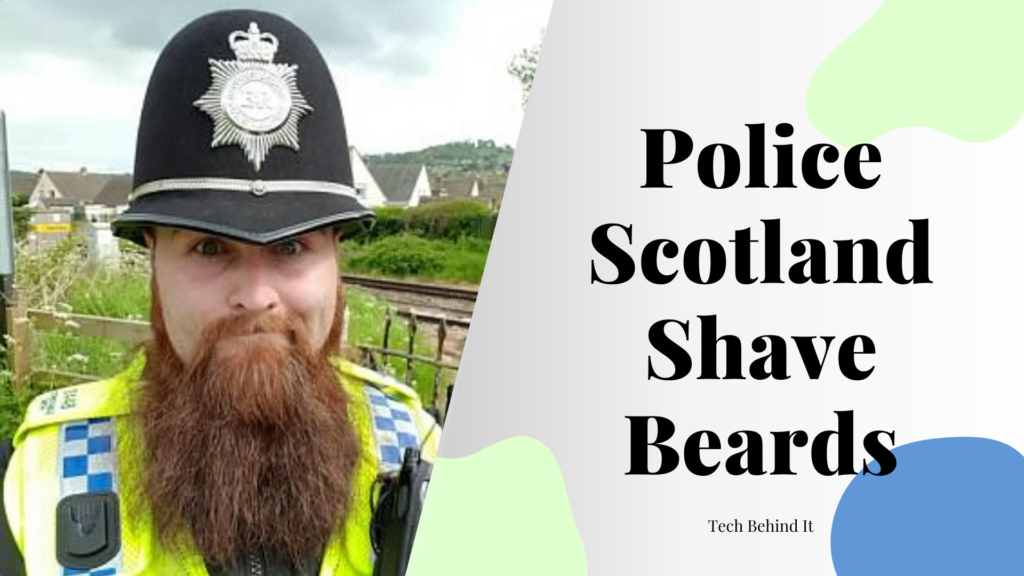Police Scotland Shave Beards said it postponed a clean-shaven policy after health and safety advice and officer input. The measure, delayed from May, will require many frontline cops and staff to shave. The Scottish Police Federation (SPF), LGBTI Police Association, and others opposed the plans, and four officers sued. Police Scotland said they will reassess the policy in 12 months.
Police Scotland Shave Beards Delays Implementation
Assistant Chief Constable Alan Speirs thanked all divisions, staff associations, and unions for their significant input during the consultation. Postponing implementation allows further evaluation of a proportionate and justifiable policy, especially when it affects officers and personnel. “This work will be reviewed in 12 months to ensure we reach an agreed position on a policy that has the health and safety of our people at its core.“ACC Speirs wrote on the force’s internal website in April that frontline officers and staff must be clean-shaven to wear FFP3 masks, with limited exceptions.
The policy would be implemented on 29 May when the chief constable authorized it. But the force had not consulted yet, and the SPF, which represents rank-and-file police personnel, claimed it had received several concerns. Police Scotland Shave Beards informed the BBC that it was postponed after consulting health and safety experts and hearing the “lived experience of its people.”
Police Scotland Beard Ban Delayed
Officers and health and safety specialists advised Police Scotland Shave Beards to delay a beard ban. The UK’s second-largest police force said a new clean-shaven policy was needed to allow officers to wear facemasks, so it put it off until at least a year. Police Scotland said that while coronavirus risks have decreased, officers responding to fires, road accidents, and chemical situations, which require PPE, still face hazards.
Postponing implementation allows further evaluation of a proportionate and justifiable policy, especially when it affects officers and personnel. “We will review this work in 12 months to reach an agreement on a policy that puts our people’s health and safety first.” The Scottish Police Federation, which represents 99% of officers, called it the “correct decision”. When an officer or employee is expected to utilize an FFP3 mask, the respiratory protection equipment policy requires them to be clean-shaven. Four male traffic cops sued Police Scotland for discrimination and disability over the policy. Religious, cultural, disability, and medical exemptions to the beard ban have been announced by Police Scotland. In May, Amanda Buchanan, legal director at Levy and McRae Solicitors, who represents them, said protecting staff was crucial but questioned the policy’s proportionality.
Other options acknowledged officers’ ability to express themselves and their beard choice, she said. It’s like asking a woman, “Why don’t you have short hair?” Just trim your hair, she urged. The way you express your identity and personality is highly essential and part of your human rights. Kate Palmer, Peninsula’s HR advice and consultancy director, said: Police Scotland’s no-beard requirement appears to be based predominantly on health and safety needs, which an employment tribunal would consider when determining the police’s legitimate aim.
Police Scotland Shave Beards should have permitted reasonable exemptions for staff who can’t be clean-shaven for religious, cultural, medical, or disability reasons. An impact assessment can help determine if the rule will negatively affect groups of employees with a protected trait so they can be accommodated. Employers that want to follow suit should remember this crucial step and give equivalent exemptions.
Who Was Its Opponent?
SPF national secretary David Kennedy hailed the action, adding the policy has been heavily criticized by several police forces. He stressed the importance of studying the policy’s necessity before adopting it, making the postponement prudent. Mr. Speirs’ April directive required clean-shaven faces to allow cops to utilize FFP3 masks. The requirement applied to cops responding to fires, traffic accidents, and chemical disasters, despite a reported decrease in COVID dangers. Officers opposed the policy, claiming the hazards had decreased and it was creating undue distress. Police Scotland is the UK’s second-largest force with 17,000 officers and 6,000 staff, yet it didn’t consult them before announcing the ban.
Many officers complained, and some sued the prohibition for health and safety, discrimination, and human rights violations. According to the SPF, officers opposing the policy filed employment tribunal cases and requested legal opinions. If the four officers who sued the ban have settled, Police Scotland has not published anything. The Metropolitan Police’s September 2022 facial hair policy allows beards and moustaches but expects personnel to look neat.
Conclusion
Police Scotland Shave Beards will delay a clean-shaven policy for officers after receiving health and safety advice and officer input. The May policy would have required many frontline police to shave. The Scottish Police Federation, LGBTI Police Association, and four officers who sued over the policy rejected the plans. The force plans to reassess the policy in 12 months to reach a posture that prioritizes officer health and safety.
Frequently Asked Questions
Can you have a beard in Police Scotland?
Police Scotland has lifted its beard ban for officers after officers protested that it was unworkable and burdensome.
Did police Scotland pay policemen $60,000 for beard bans?
Police Scotland Shave Beards awarded £60,000 to four officers who sued after being told to shave their faces. Before a force-wide beard policy was proposed, four traffic policemen were compensated to shave.
May British police have beards?
Yes, UK police personnel can wear beards, but each force or department has its own rules.
